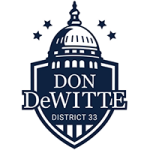Governor Signs DeWitte Legislation that Addresses Social Isolation in Nursing Homes
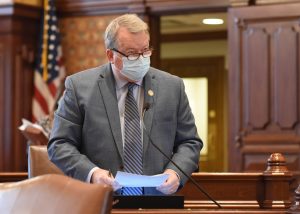 This last year-and-a-half has been incredibly difficult for seniors who have been largely unable to touch or hug their loved ones during the COVID-19 pandemic. Through legislation I championed this year that was signed into law on Friday, Illinoisans can be assured that moving forward more of a balance will be created between physical and social-emotional health.
This last year-and-a-half has been incredibly difficult for seniors who have been largely unable to touch or hug their loved ones during the COVID-19 pandemic. Through legislation I championed this year that was signed into law on Friday, Illinoisans can be assured that moving forward more of a balance will be created between physical and social-emotional health.
Senate Bill 2137 now requires all long-term care facilities in Illinois to adopt and implement written policies and procedures to help prevent social isolation of nursing home residents, including making technology available for online visits with loved ones. The legislation sets forth specific requirements for addressing social isolation prevention, and mandates that inspections of facilities include a determination of whether facilities are in compliance with social isolation prevention protocols. Adherence to the social isolation prevention policies would be a condition of licensure.
It was a pleasure to work with Senator Jacqueline Collins (D-Chicago) on the passage of this important legislation, and the passage and signing of this bill represent bipartisanship at its very best.
Through SB 2137, facilities will adopt and implement policies to combat social isolation of residents in a variety of ways:
- Virtual visitation would be considered in addition to existing in-person visitation policies.
- Technology and assistive equipment may be funded through federal Civil Monetary Penalty (CMP) Funds and/or other state and federal resources.
- Cleaning and sanitizing of equipment and the development of a resident’s individualized visitation schedule would be included in a facility’s virtual visitation policy.
- Facilities would be permitted to train volunteers and staff to assist residents in virtual visitation.
- A resident’s right or use of personal devices would not change.
- Penalties for nursing homes not in compliance would go into effect in 2023; one year after the stated distribution of CMP funds in Illinois.
- IL Department of Public Health shall adopt social isolation prevention policies within 60 days after effective date of the Act; rules will take into account a facility’s barriers to connectivity and Internet bandwidth limitations.
Indoor Mask Requirement Returns, Teachers and Health Professionals Ordered to Get Vaccinations or Regular Testing
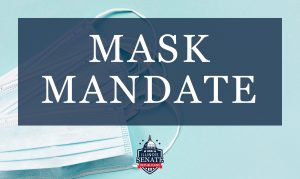 On Thursday, Gov. Pritzker announced a new statewide indoor mask mandate. The Pritzker administration is also requiring that all P-12 teachers and staff, higher education teachers and staff, college students, and healthcare workers (including nursing home workers) get vaccinated for COVID-19 or get tested once per week. The new masking requirement takes effect on Monday, August 30, and the vaccinate-or-test mandate for the healthcare and education sectors begins September 5.
On Thursday, Gov. Pritzker announced a new statewide indoor mask mandate. The Pritzker administration is also requiring that all P-12 teachers and staff, higher education teachers and staff, college students, and healthcare workers (including nursing home workers) get vaccinated for COVID-19 or get tested once per week. The new masking requirement takes effect on Monday, August 30, and the vaccinate-or-test mandate for the healthcare and education sectors begins September 5.
Since the Governor’s press conference at 10:00 AM on Thursday, my office has received several phone calls and emails from constituents seeking additional information or clarification on the orders. I will be pulling together a summary document that explains what the Executive Order means for Pre-K-12 schools, colleges, students and employees of both, and for hospitals, nursing homes, and those who work in health care and senior care settings. You can read the Executive Order here. This newest EO is #87 since the beginning of the pandemic. That’s 87 times since March, 2020 that the Governor has unilaterally issued a mandate without engaging with the legislature.
Pritzker cited the surge of coronavirus cases across Illinois fueled by the Delta variant as the reason for the additional mitigations. The Illinois Education Association (IEA) and the Illinois Federation of Teachers (IFT) released statements in support of the new vaccination requirements.
Meanwhile, the Governor and AFSCME, the largest state employee union, are still in talks over vaccine mandates for state employees. On Aug. 25, the union announced that it firmly opposes a “rigid mandate” requiring vaccinations for state employees. Following the Governor’s announcement of his new mandates the next day, AFSCME released a statement requesting similar vaccinate-or-test flexibility to any mandate for state employees.
Lawmakers Return to Capitol to Deal with Unconstitutional Map
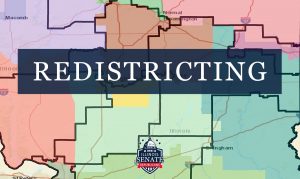 After the recent release of census data made it clear that Illinois Democrats’ partisan legislative maps are not constitutional, the majority party scheduled a one-day session for Aug. 31 to try to “fix” their maps. They also ordered a series of seven redistricting hearings which began on Aug. 26 and will wrap up on Sunday.
After the recent release of census data made it clear that Illinois Democrats’ partisan legislative maps are not constitutional, the majority party scheduled a one-day session for Aug. 31 to try to “fix” their maps. They also ordered a series of seven redistricting hearings which began on Aug. 26 and will wrap up on Sunday.
Legislative districts are supposed to be roughly equal in population, but they don’t have to be exactly the same. According to previous rulings from the United States Supreme Court, the maximum deviation from the most-populated to the least-populated districts is capped at 10 percent.
During the spring legislative session, Democrat leaders refused to wait for the release of the actual census data to draw maps, and instead rushed ahead with less accurate American Community Survey (ACS) data. When the newly-released census data was plugged into their maps, it showed deviations between districts as high as roughly 30 percent, three times the allowable limit. It is expected that Democrats will file new legislation to update their maps to bring districts within the proper population limits.
Still, there are serious legal questions regarding whether lawmakers can make changes to the maps at this point during the year. The Illinois Constitution sets a June 30 deadline for lawmakers to pass a map, which has already passed. After that date, the authority to draw a map falls to a bipartisan redistricting commission.
Meanwhile, multiple lawsuits are pending against the current map, including McConchie v. Illinois, filed by Illinois Senate Republican Leader Dan McConchie (R-Hawthorn Woods), who argues that the court should demand that the process be handed over to the bipartisan redistricting commission.
I believe a bipartisan panel would enable all sides to work together to put together legislative maps that better protect the voices of communities across the state.
Could Lawmakers Act on New Energy Legislation?
After failing to advance a bill during the regular legislative session, negotiators have continued to work over the summer on new comprehensive energy legislation.
The effort started as an attempt to help grow the state’s green energy portfolio while saving two large nuclear plants from closing. Disagreements quickly appeared over the potential future closures of coal and natural gas power plants. As you may recall, I recently penned an op ed on the subject. You can read it here.
Gov. JB Pritzker and environmental groups have pushed for a firm date for the closure of all carbon-producing power facilities, while local governments, unions and many lawmakers have fought to preserve the large number of good-paying jobs provided by the existing coal and gas plants, as well as their contributions to the state’s energy portfolio and economy.
As negotiations continue, a new energy bill could emerge for a vote when lawmakers are in Springfield on Aug. 31, though nothing is scheduled yet.
Fall Traveling Office Hours Announced
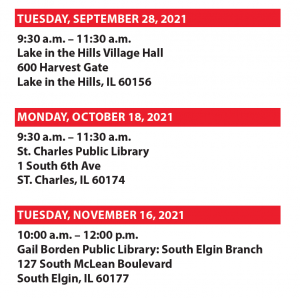 I want to thank those residents from the Algonquin area who attended my traveling office hours earlier this week at the Algonquin Area Public Library. I was able to speak with a few constituents about issues that are important to them and about the struggles they are having with various state agencies and departments.
I want to thank those residents from the Algonquin area who attended my traveling office hours earlier this week at the Algonquin Area Public Library. I was able to speak with a few constituents about issues that are important to them and about the struggles they are having with various state agencies and departments.
While my district office is located in West Dundee, the 33rd Senate District is very large and I recognize that the Dundee location is not convenient for all constituents who would like help with an issue involving a state agency or department. My talented staff holds traveling office hours throughout the district to provide easy access to district services for those who do not want to drive to West Dundee.
Three fall dates were recently announced, and I invite all residents who would like to talk with a constituent services expert to attend the event closest to their home or work. I attend these events as my schedule allows.
New Laws Designed to Help Combat Teacher Shortage
A pair of bills recently signed into law is aimed at helping schools recruit new teachers. Both laws make changes to pension code issues that have made it harder for many schools to keep classrooms staffed. I was a proud supporter of both bills.
The state’s teacher pension system has a cap on how much a teacher’s salary can increase near retirement. This can make it very difficult for schools to staff summer school programs because of the additional pay for summer instruction.
Senate Bill 1646, sponsored by State Sen. Steve McClure (R-Springfield), removes the pension cap for schools conducting summer school between May 1, 2021, and Sept. 15, 2021. The legislation also allows former private school teachers to be able to buy into the state’s pension system so that their years of private teaching can count toward their retirement. The goal is to create incentives for teachers to make the jump to public schools.
House Bill 2569, sponsored by State Sen. Dale Fowler (R-Harrisburg) extends the sunset on the pension code that allows retired teachers to return to teaching in subject shortage areas without impairing their retirement status or retirement annuity, from June 30, 2021, to no later than June 30, 2024.
State Unemployment Rate Remains High
Despite a fast-moving national economic recovery following the COVID-19 pandemic, the unemployment rate in Illinois remains significantly higher than the national average.
The Land of Lincoln currently holds the eighth highest unemployment rate in the country at 7.1 percent, compared to the average U.S. rate of 5.4 percent. As businesses have reopened and people have headed back to work, the national rate has been steadily declining while Illinois has been stuck at that same 7.1 percent since March.
The state’s jobs crisis hasn’t been felt equally, with African Americans facing a staggering 15.9 percent unemployment rate in Illinois, nearly three times the rate for Caucasians.

